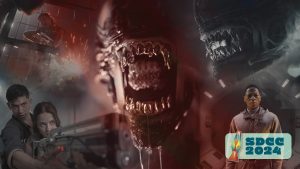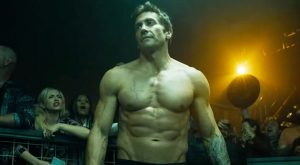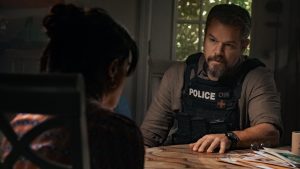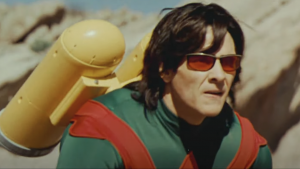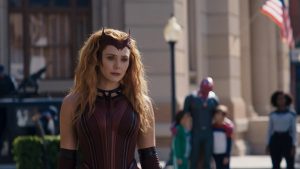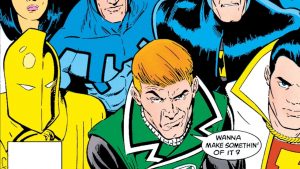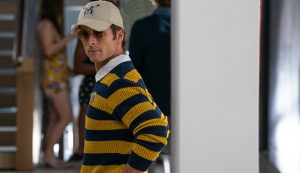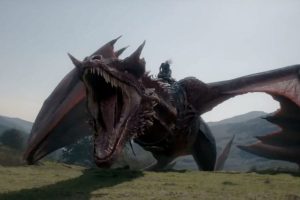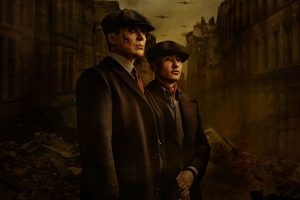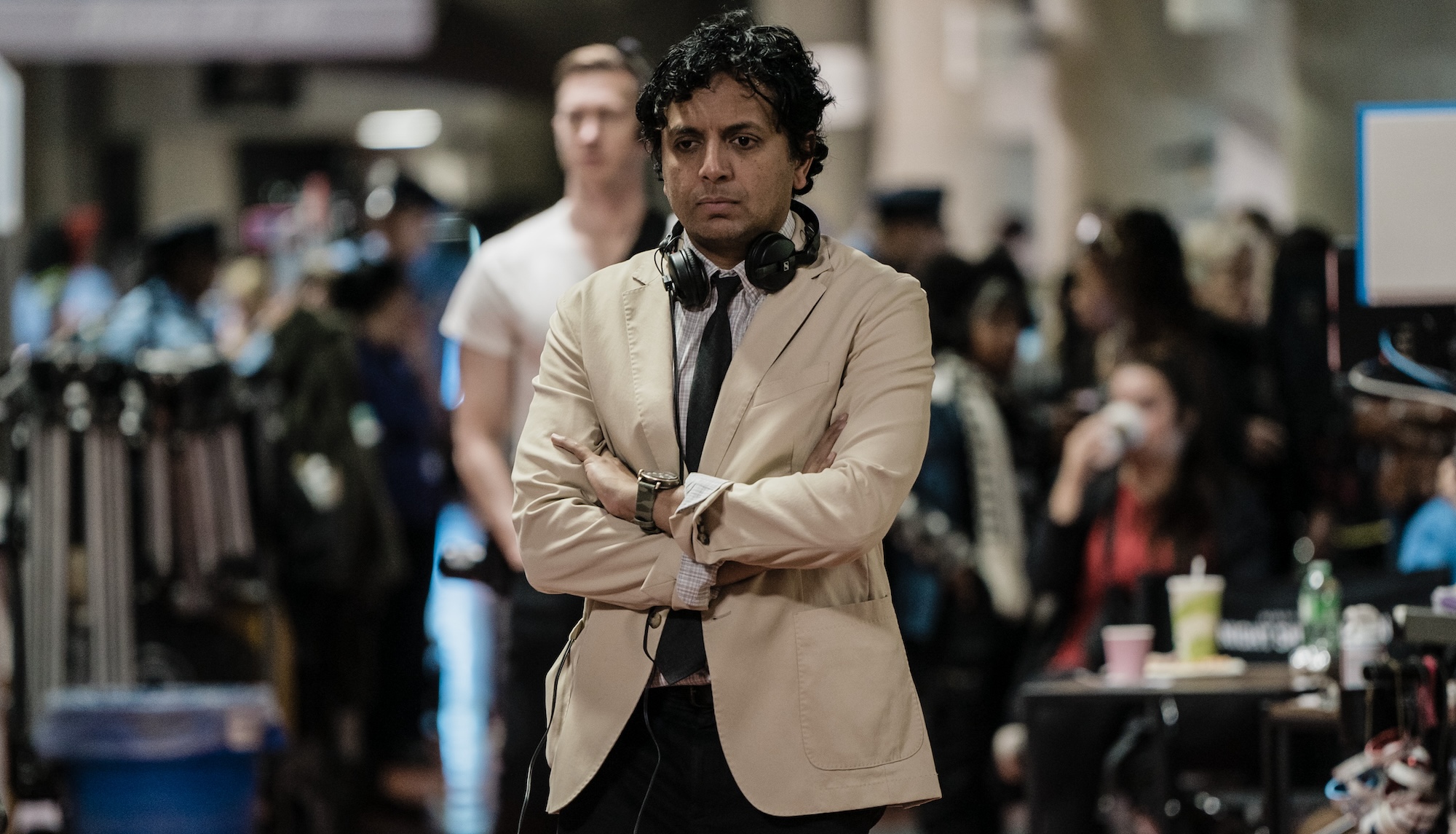
On a humid and muggy evening in New York City’s Soho neighborhood, filmmaker and genre maestro M. Night Shyamalan seems particularly giddy while standing in front of a room of assorted press. A major reason is probably that tonight is also the birthday of his leading man and collaborator, Josh Hartnett. The pair apparently have plans for a nice dinner upstairs. However, he also seems genuinely curious to see what a group of journalists are going to think about his and Hartnett’s latest movie, Trap—a serial killer thriller told from the point-of-view of the killer.
According to Shyamalan, it felt just like the type of movies he and his contemporaries made in the 1990s, although we can attest there has never quite been a serial killer movie like this. Not only is Hartnett’s deceptively affable Cooper a predatory wolf in sheep’s clothing, but he’s also the hero of his own story. After all, like any other genial suburban dad, Trap finds Coop happily taking his daughter Riley (Ariel Donoghue) to a pop star’s concert… only to discover the entire event is really an elaborate mouse trap to catch his nefarious alias, “the Butcher.” It’s fair to say, you haven’t quite seen a movie like this, and that is what makes it so “‘90s” in Shyamalan’s mind when he sits down with us a few days later.
“The industry was kind of geared toward entertainment [for] the audience while using cinema at its highest level,” Shyamalan says when recalling his first decade in Hollywood. “Filmmakers and auteurs were taking everything they did, and they were happy and honored by the idea of using their craft towards making rides for the audience. It didn’t feel like you would have to talk down to the audience, you could do daring and wonderful things.”
Shyamalan first crossed into the industry while he was still a student at New York University. He wrote, directed, and starred in Praying with Anger (1992) before receiving his diploma. While that film was intensely intimate and personal for Shyamalan, he admits his favorite type of pictures became the ones he made: populist entertainments with striking originality and artistry. He misses the kind of films where, he says, you don’t have to rationalize to yourself “yeah the performances stink, but it was really fun.”
Says the director, “Everything was really excellent… whereas now it feels a little bit like you choose one or the other. You choose a kind of ride or you do a very independent thing that’s meant more as a personal thing. I love to do both together, and I think the industry felt that way [then].”
For Shyamalan this extends to a range of movies from the 1980s and ‘90s. Everything from Die Hard to Home Alone he thinks represents a type of Hollywood filmmaking that is somewhat lost, but which needn’t stay gone forever. He even insists that the often romanticized year of 1999—a year of landmark American films, including Shaymalan’s blockbuster breakthrough and Oscar-nominated The Sixth Sense—could happen again if the industry read the tea leaves.
“That’s an uncomfortable space for the industry,” Shyamalan says when we ask if he thinks there is a general reticence to greenlighting a movie like The Sixth Sense, which was a $30 million original idea from a relatively unknown filmmaker. “And that discomfort, in my opinion, is a weapon. We could have 1999 over and over, and over again. You can have The Matrix and Magnolia, and American Beauty, and Blair Witch, and Sixth Sense all in that one year. You could have that over and over if you embrace it’s going to be a little uncomfortable and new, and we’re going to try different approaches. But the goal is to really entertain the audience.”
As Shyamalan notes, he has reasons to be optimistic about the future too. There seems to be a growing appetite in younger audiences for new ideas and stories, and as he points out, Trap is one of his most viewed trailers ever online. “When I talk to the studios, I say let’s lean into how weird it is, and how different it is, so that they can’t ever tell what it feels like to be at the movie unless they go [see it].”
And when it came to Trap, the weirdness of this new idea came partially out of just being a dad… a little bit like the serial killer in the film. Trap even includes Saleka Shyamalan among its cast. A professional singer-songwriter, Saleka plays a fictional pop star named Lady Raven. In the story, Lady Raven agrees to help turn her concert into a serial killer ambush. It’s obviously a heightened concept for a father and daughter to collaborate on, but it partially comes from Night having many fond memories of taking Saleka and his other daughters to see various pop stars in Philadelphia when they were young.
“When you become a girl dad—I mean, it’s three girls!—you definitely learn to love the things that they love,” Shyamalan explains. “And it’s very sweet because you see the way they see it, and you’re seeing it from their point-of-view, and it’s just a lovely thing.”
According to the filmmaker, he took them to artists the whole family enjoyed, such as getting in on the ground floor (or close to it) with Adele when she came to Philly shortly after the release of her 21 album (and long before it went gold or platinum). He calls that concert “a big moment” in his household. Coincidentally—or perhaps not?—discussions about serial killers like Hartnett’s Cooper in Trap were also a regular subject du jour.
“We talked about it,” Shyamalan says of conversations with his wife Dr. Bhavna Vaswani, who has a doctorate in clinical developmental psychology, about Cooper’s profile. “But we’re all so steeped in this research of serial killers and a lack of empathy and sociopaths, and what is it that moves them? This kind of need for stimulation. What is their pathology underneath? It’s obviously as varied as human beings are varied, even within the sociopathy group. Whether it’s John Wayne Gacy or Ted Bundy, all these people, they’re completely different about what motivated them and their overall profile.”
To Shyamalan, half the fun of making a serial killer thriller was getting to understand what made Cooper tick as a father, as a family man, and as a killer. It’s something he and Hartnett also discussed at length for more than a month before cameras ever got involved.
Says Shyamalan, “One of the things that was important to me is it wasn’t ‘oh he was abused and then he became like this.’ That wasn’t the architecture of this person. At the core of Cooper is ‘do I qualify as being human?’ That is something that he worries about. ‘Am I even part of the continuum of the human experience?’ And then the movie kind of answers that, or at least he finds an answer in that. Am I connected or not?”
The trick of Cooper and Hartnett’s disarming performance is that he can be quite charismatic, which is a bit like reports of Bundy and other real-life killers, as Shyamalan points out. But there is an anger underneath that viewers are encouraged to either spot or ignore at their peril. On the one hand, he seems to genuinely love his daughter, which Shyamalan cites as the enigma at the core of the movie, and on the other… he’s the Butcher!
“I think against your own will you’re kind of rooting for him,” Shyamalan muses. “That’s why Josh was perfect for it, because he’s so likable. He’s so charming and handsome… There’s a lot about him to relate to. He just has this other side to him. So that’s a really interesting thing as I’m writing it—the kind of wicked part of it is that you’re [thinking], ‘I can’t believe I’m rooting for him. Why am I rooting for him?’”
Without giving much away, Shyamalan says one of the conclusions he and Hartnett reached was there is something very seductive about someone whose perspective is so coldly confident, to the point of being reptilian: “His worldview, ultimately, is ‘everything always works out for me.’ There’s always an answer. So he waits for it. Normally when we feel pressure, all our options narrow down. But for someone who doesn’t feel fear, they actually see all the possibilities, and there’s always an answer, there’s always a way out.”
Shyamalan even recognizes there’s a moment in the movie where, after yet another close call for Coop, his test audiences allegiances shifted.
“That joy of believing the universe is on your side is delicious,” Shyamalan insists. “And the audience, you can feel them whenever that happened, when he was like, ‘It happened again! It worked out!,’ they all start laughing and almost applauding… They enjoy the humor and the kind of optimism of that.”
A serial killer movie with an optimistic spring in its step? That is a hundred percent original, “weird,” and definitely Shyamalan, ‘90s or otherwise.
Trap will begin catching moviegoers on Friday, Aug. 2.
The post M. Night Shyamalan Thinks Audiences Are Ready for ‘90s Movies’ Originality Again appeared first on Den of Geek.
